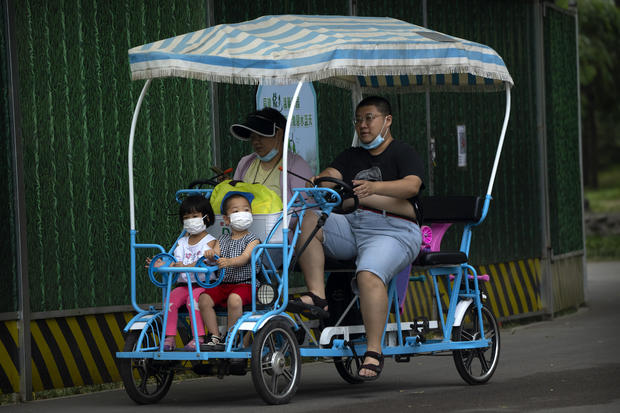Kids in China’s capital now must show negative COVID test to go to a park
[ad_1]
Beijing — While much of the world tries to get back to something resembling normal, the draconian coronavirus control measures imposed under China’s so-called “dynamic zero-COVID” policy seem only to extend more broadly across every aspect of daily life. Now, even kids looking to play outside in Beijing have to prove they’re virus-free.
An announcement posted online Tuesday by the government agency that operates Beijing’s public parks said children over three years of age would henceforth need to provide negative PCR test results from within the past 72 hours to use playgrounds. Adults have long had to cope with similar requirements to use parks, but especially with kindergartens across Beijing shuttered since late April, the new restriction will be a headache for many parents.
Mark Schiefelbein/AP
In mainland China’s major cities, like Beijing and Shanghai, regular COVID tests have become a part of daily life. The “72-hour negative test result” is required not just to enter parks, but to use any closed, shared space — everything from movie theaters to supermarkets and office buildings. Nobody can even go to work without a fresh test.
Nationally-recognized COVID test results are stored on an official smartphone app to be displayed to security officials. Senior citizens and others without access to modern smartphones must show a valid national identity card and then face additional verification measures before entering parks, or pretty much anything else.
Global financial services group Nomura has estimated that 814 million people in China — more than double the entire U.S. population — need to be tested regularly just to go about their daily lives.
Frequent, localized mass-testing campaigns have been rolled out as soon as outbreaks crop up to identify and isolate cases, but the government is now grappling with the sustainability of this tactic.
The regulator for the national medical insurance fund has asked local governments to fund their own “normalized mass screening,” instead of spending money that is meant to be reserved for other purposes.
Andy Wong / AP
With thousands of mobile testing sites now dotting China’s cities, there are also mounting concerns over the environmental impact of the mass-testing approach.
“The sheer amount of medical waste that is being generated on a routine basis [is] at a scale that is practically unseen in human history,” Li Yifei, an environmental expert at New York University Shanghai, recently told France’s AFP news agency.
[ad_2]
Source link












